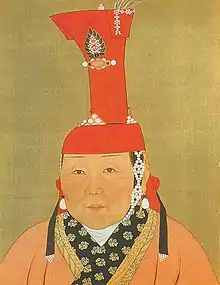Shirindari
Shirindari (Mongolian: Шилийндалай, Chinese: 失怜答里; pinyin: Shīliándálǐ) was Empress of China and Khatun of Mongols from 1294 to 1299 as principal consort of Temür Khan.
| Shirindari | |||||
|---|---|---|---|---|---|
 Portrait of Shirindari according to George Zhao | |||||
| Empress of China and Khatun of Mongols | |||||
| Tenure | 1294 - 1299 | ||||
| Predecessor | Nambui | ||||
| Successor | Bulugan | ||||
| Died | 1299 | ||||
| Spouse | Temür Khan | ||||
| |||||
| Clan | Khongirad | ||||
Biography
Like Chabi and Nambui, she was from Khongirad clan. Her father was Olochin, who was a brother of Nambui.[1] According to History of Yuan, she was married to Temür Khan and bore his only son Prince Dashi (d. 3 January 1306). However, Japanese researcher Uno Nobuhiro thinks of this information as later falsification by Ayurbawada's mother Dagi, according to him it was Bulugan who bore Temür a son.[2] She died in 1299 and was replaced by Bulugan as principal wife of Temür.[3][4] She was given a posthumuous title Empress Zhēncí Jìngyì (Chinese: 贞慈静懿皇后; lit. 'Chaste, kind, quiet and good Empress') by Külüg Khan.
References
- Zhao, George Qingzhi (2008). Marriage as Political Strategy and Cultural Expression: Mongolian Royal Marriages from World Empire to Yuan Dynasty. Peter Lang. p. 107. ISBN 978-1-4331-0275-2.
- Uno, Nobuhiro. "チンギス家の通婚関係の変遷 Changes of Affinal Relationships of the Family of Chingis Khan. Toyoshi Kenkyu 52-3, 1993, 399-434. (in Japanese)". 東洋史研究 Toyoshi Kenkyu.
- May, Timothy (2016-11-07). The Mongol Empire: A Historical Encyclopedia [2 volumes]: A Historical Encyclopedia. ABC-CLIO. p. 45. ISBN 978-1-61069-340-0.
- Twitchett, Denis C.; Franke, Herbert; Fairbank, John King (1978). The Cambridge History of China: Volume 6, Alien Regimes and Border States, 907-1368. Cambridge University Press. p. 504. ISBN 978-0-521-24331-5.
| Preceded by Nambui |
Empress of the Yuan dynasty 1294–1299 |
Succeeded by Bulugan |